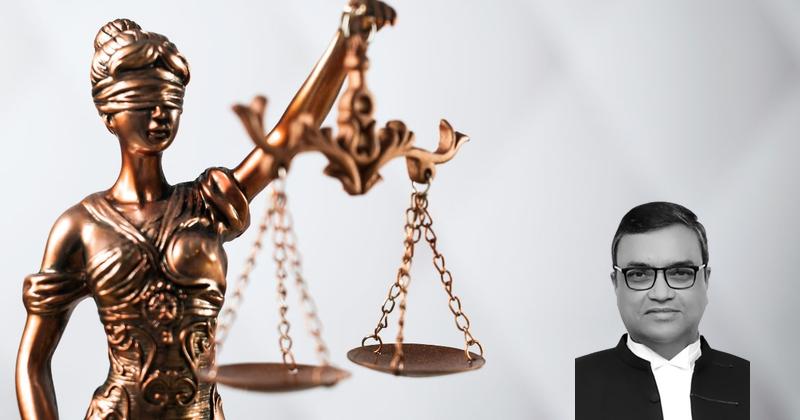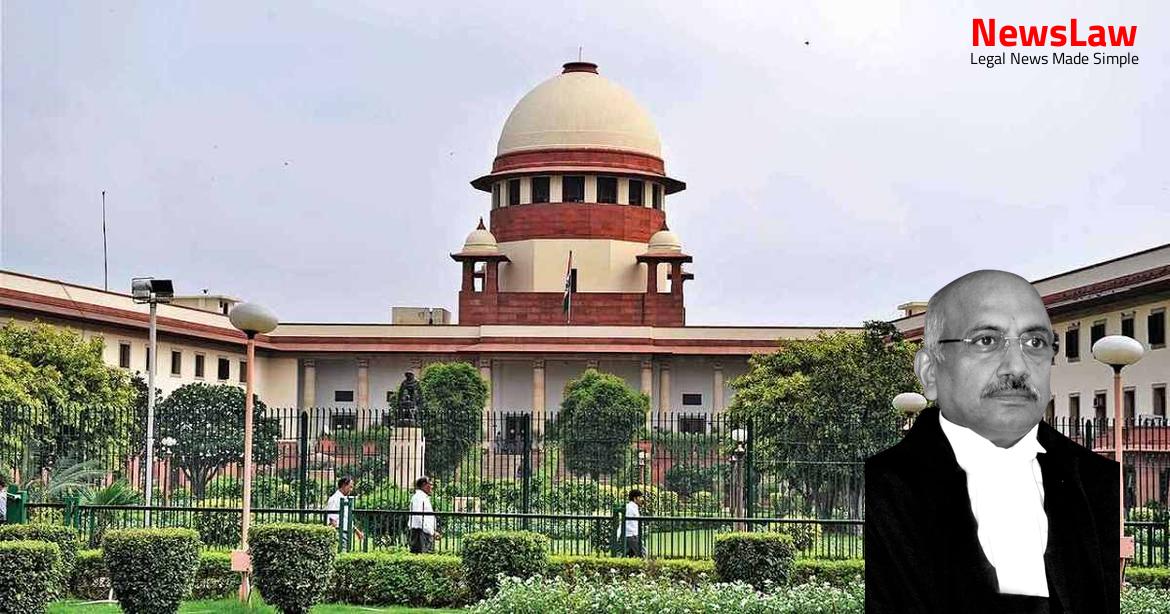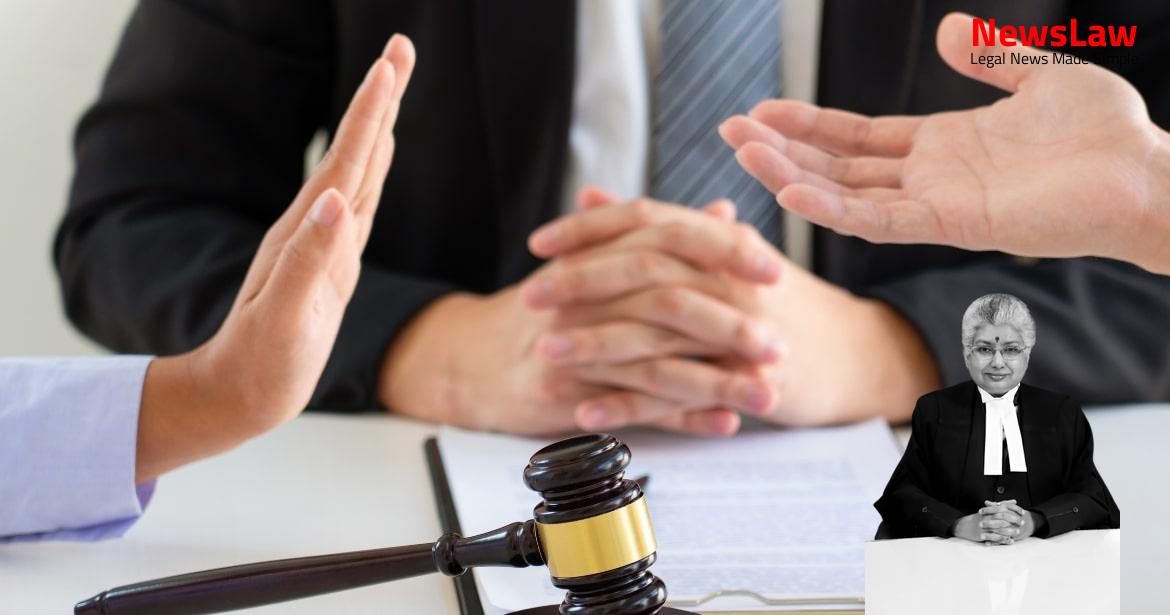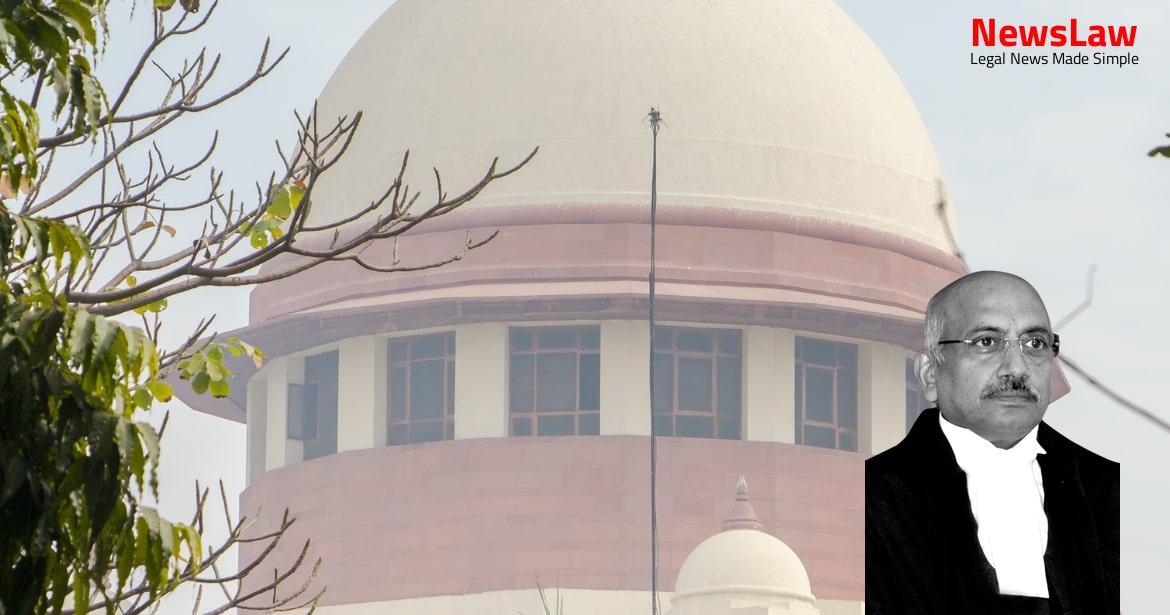A revision was carried by the appellants from the order dated 19 March, 2008 before the Revisional Court which, vide its order dated 21 February, 2009, dismissed the objection filed by the respondents 1 to 3 and directed the Executing Court to proceed with the execution of the decree whilst treating such objection as non-maintainable. The High Court, by its judgment and order dated 4 February, 2011, quashed the order passed by the Revisional Court and relegated the parties to the remedy of having their rights, in respect of the suit property, adjudicated by the appropriate forum. Appellants, as plaintiffs, through their power of attorney holder, instituted a civil suit (“Suit”, hereafter) before the Trial Court under section 38 of the Specific Relief Act, 1963 (“Specific Relief Act”, hereafter) against three defendants – a son of Khatoon Jannat Bibi named Asad Ullah Kazmi [defendant no.
Kazmi filed his written statement in the Suit on 5 December, 1990 where he inter alia contended that the Suit was barred by section 331 of the UPZA & LR Act and not maintainable before a civil court since the suit property was bhoomidhari land.
Upon the appellants moving an application under Rules 5 and 10 of Order VIII, CPC for pronouncement of judgment against Samiullah, the same was allowed by the Trial Court by its order dated 5 August, 1991, to which we propose to advert in course of our analysis. Further, on 7 December, 2004, the appellants filed a contempt petition against the respondents alleging contempt of orders dated 31 May, 1990 and 5 August 1991, and the Executing Court order dated 16 January, 1998 by interfering with the appellants’ possession of the suit property. In course of rendering its judgment, the High Court held the order dated 5 August, 1991, and consequently the decree drawn on the basis thereof, to be beyond jurisdiction and a nullity. The order dated 5 August 1991, passed by the Trial Court, in the Suit, restrained only the defendant no.2 from interfering with the peaceful enjoyment of the appellants’ rights relating to the suit property, but did not restrict the sons of Kazmi from dealing with or transferring the same. The order dated 5 August, 1991 was not a judgment within the scope of section 2(9) read with Rule 4(2) of Order XX, CPC and did not meet the basic requirements of a “judgment” and a decree as per section 2(9) and 2(2), CPC, respectively.
The High Court fell into error by not appreciating the fact that the Executing Court exceeded its jurisdiction by going behind the order dated 5 August, 1991 and the decree that was drawn up in terms thereof, returning a finding that the same was not executable.
Sunil Madan was misplaced in the present case as this Court, in Balraj Taneja (supra), while holding that reasons must be given while decreeing a suit under Rule 10 of Order VIII, CPC, was seized of a matter where the decree was challenged in appellate proceedings. The High Court had rightly granted all the parties liberty to have the title to the suit property adjudicated by the appropriate forum; hence, it could not be said that the appellants were prejudiced in any manner whatsoever. Rule 10 of Order VIII, CPC, used as the primary source of power by the Trial Court in passing the order dated 5 August, 1991 against Samiullah, postulates the procedure that could be adopted when a party fails to present its written statement upon the same being called for by the court.
Procedure when party fails to present written statement called for by Court.— Where any party from whom a written statement is required under rule 1 or rule 9 fails to present the same within the time permitted or fixed by the Court, as the case may be, the Court shall pronounce judgment against him, or make such order in relation to the suit as it thinks fit and on the pronouncement of such judgment a decree shall be drawn up.”
We have no hesitation to hold that Rule 10 is permissive in nature, enabling the trial court to exercise, in a given case, either of the two 13 alternatives open to it. Therein, this Court ruled that a court is not supposed to pass a mechanical judgment invoking Rule 10 of Order VIII, CPC merely on the basis of the plaint, upon the failure of a defendant to file a written statement.
But if the plaint itself indicates that there are disputed questions of fact involved in the case regarding which two different versions are set out in the plaint itself, it would not be safe for the court to pass a judgment without requiring the plaintiff to prove the facts so as to settle the factual controversy. Balraj Taneja (supra) also lays down the law that provision of Rule 10 of Order VIII, CPC is by no means mandatory in the sense that a court has no alternative but to pass a judgment in favour of the plaintiff, if the defendant fails or neglects to file his written statement. Since facts are required to be pleaded in a plaint and not the evidence, which can be adduced in course of examination of witnesses, mere failure or neglect of a defendant to file a written statement controverting the pleaded facts in the plaint, in all cases, may not entitle him to a judgment in his favour unless by adducing evidence he proves his case/claim.
It is clear that so many date has been given for written statement and lastly it was 29.4.91, which was fixed for written statement and for issues, but the defendant has ( sic, not) filed written statement and on this ground the plaintiff has moved the above application 68-C. Fix 9.9.1991 for Issues.” In the present case, Kazmi had indeed filed his written statement dealing with the appellants’ plaint before the order dated 5 August, 1991 was made. The High Court rightly observed that even on pronouncement of judgment against Samiullah, the lis remained alive as against Kazmi and decision on the objection as to maintainability could have resulted in a contrary decision.
The result is that the suit 18 stands dismissed as against the principal defendant without any determination by the Trial Court on his objection that such court did not possess the jurisdiction to entertain and try the suit. As in the present case, where even one of several defendants had filed a written statement, it would be a judicious exercise of discretion for the court to opt for the second alternative in Rule 10 of Order VIII, CPC unless, of course, extraordinary circumstances exist warranting recourse to the first alternative. While allowing the appeal and setting aside the decree passed by the high court and remanding the suit to the Court of first instance for trial according to law, this Court noted that Rules 1 to 8 of Order XX, CPC are, by the express provision contained in Rule 3(5) of Order XLIX, CPC inapplicable to a Chartered High Court in the exercise of its ordinary or extraordinary original civil jurisdiction and hence, a judge of a Chartered High Court was not obliged to record reasons in a judgment strictly according to the provisions contained in Rules 4(2) and 5 of Order XX, CPC.
Opportunity to the parties interested in the dispute to present their respective cases on questions of law as well as fact, ascertainment of facts by means of evidence tendered by the parties, and adjudication by a reasoned judgment of the 20 dispute upon a finding on the facts in controversy and application of the law to the facts found, are essential attributes of a judicial trial. It is unfortunate that the learned trial Judge has recorded no reasons in support of his conclusion, and the High Court in appeal merely recorded that they thought that the plaintiff had sufficiently proved the case in the plaint.” However, there, it was an appellate decree which this Court was called upon to examine. Section 47, CPC, being one of the most important provisions relating to execution of decrees, 21 mandates that an executing court shall determine all questions arising between the parties to the suit or their representatives in relation to the execution, discharge, or satisfaction of the decree and that such questions may not be adjudicated in a separate suit.
A court executing a decree cannot go behind the decree: between the parties or their representatives it must take the decree according to its tenor and cannot entertain any objection that the decree was incorrect in law or on facts.
Jai Prakash University, this Court further expounded the powers of a court under section 47, CPC in the following words: “ 24. The legality of the order of the High Court, together with the order of the Executing Court that the former went on to uphold, has to be tested having regard to the settled position of law as noticed above and bearing in mind that the powers of an executing court, though narrower than an appellate or revisional court, can be exercised to dismiss an execution application if the decree put to execution is unmistakably found to suffer from an inherent lack of jurisdiction of the court that made the same rendering it a nullity in the eye of law. What appears to be of significance in the light of the decisions referred to above is the importance of the legal term ‘jurisdiction’, and the question whether the Trial Court did have the jurisdiction to pass the order it did on 5 August, 1991 followed by the decree signed on 11 November, 1991. … This jurisdiction of the Court may be qualified or restricted by a variety of circumstances. The extent to which the conditions essential for creating and raising the jurisdiction of a Court or the restraints attaching to the mode of exercise of that jurisdiction should be included in the conception of jurisdiction itself is sometimes a question of great nicety… But the distinction between existence of jurisdiction and exercise of jurisdiction has not always been borne in mind and this has sometimes led to confusion. A judgment pronounced by a Court without jurisdiction is void, subject to the well-known reservation that when the jurisdiction of a Court is challenged, the Court is competent to determine the question of jurisdiction, though the result of the enquiry may be that it has no jurisdiction to deal with the matter brought before it. *** it is clear that before a Court can be held to have jurisdiction to decide a particular matter it must not only have jurisdiction to try the suit brought but must also have the authority to pass the orders sought for. The relevant observations made in Rafique Bibi (supra) read thus: “ 6.
The lack of jurisdiction in the court passing the decree must be patent on its face in order to enable the executing court to take cognizance of such a nullity based on want of jurisdiction, else the normal rule that an executing court cannot go behind the decree must prevail. A decree suffering from illegality or irregularity of procedure, cannot be termed inexecutable by the executing court; the remedy of a person aggrieved by such a decree is to have it set aside in a duly constituted legal proceedings or by a superior court failing which he must obey the command of the decree. What follows from a conspectus of all the aforesaid decisions is that jurisdiction is the entitlement of the civil court to embark upon an enquiry as to whether the cause has been brought before it by the plaintiff in a manner prescribed by law and also whether a good case for grant of relief claimed been set up by him. Where interim relief is claimed in a suit before a civil court and the party to be affected by grant of such relief, or any other party to 28 the suit, raises a point of maintainability thereof or that it is barred by law and also contends on that basis that interim relief should not to be granted, grant of relief in whatever form, if at all, ought to be preceded by formation and recording of at least a prima facie satisfaction that the suit is maintainable or that it is not barred by law.
However, if an extraordinary situation arises where it could take time to decide the point of maintainability of the suit and non- grant of protection pro tem pending such decision could lead to 29 irreversible consequences, the court may proceed to make an appropriate order in the manner indicated above justifying the course of action it adopts. Turning to the facts of the present case, Kazmi had challenged the maintainability of the Suit in the written statement filed by him before the Trial Court contending inter alia that the suit property was bhoomidhari land owing to which the Suit was barred by section 331 of UPZA & LR Act as well as it was barred under section 41(h) of the Specific Relief Act and, thus, not maintainable before the civil court. The legal and factual position of the present case having been noted above, we hold that a decision rendered by a court on the merits of a controversy in favour of the plaintiff without first adjudicating on its competence to decide such controversy would amount to a decision being rendered on an illegal and erroneous assumption of jurisdiction and, thus, be assailable as lacking in inherent jurisdiction and be treated as a nullity in the eye of law; as a logical corollary, the order dated 5 August, 1991 is held to be ab initio void and the decree drawn up based thereon is inexecutable.
Also Read: https://newslaw.in/supreme-court/analysis-of-set-off-in-insolvency-proceedings/
What a judgment should contain is indicated in Order 20 Rule 4(2) which says that a judgment ‘shall contain a concise statement of the case, the points for determination, the decision thereon, and the reasons for such decision’. Learned counsel for Respondent 1 contended that the provisions of Order 20 Rule 4(2) would apply only to contested cases as it is only in those cases that ‘the points for determination’ as mentioned in this rule will have to be indicated, and not in a case in which the written statement has not been filed by the defendants and the facts set out in the plaint are deemed to have been admitted. This infirmity in the present judgment is glaring and for that reason also the judgment cannot be sustained.” (underlining ours, for emphasis)
Case Title: ASMA LATEEF Vs. SHABBIR AHMAD (2024 INSC 36)
Case Number: C.A. No.-009695-009695 / 2013



